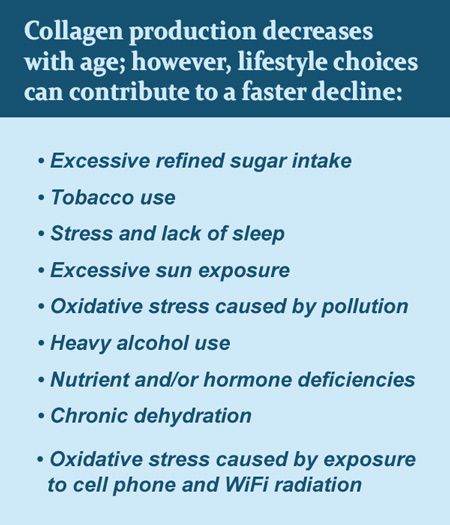Supplementation with a collagen supplement improves flexibility and joint pain, according to a new human clinical study.
The study was conducted jointly by researchers at Baden-Württemberg, Germany and South Carolina, U.S.A.
Results of the study were divided into two different papers with different areas of interest: flexibility and pain.
The papers were published simultaneously in the Journal of Integrative and Complementary Medicine and the Journal of Clinical Trials.
What is collagen?
Collagen is the main structural protein in the extracellular matrix found in the body’s various connective tissues. As the main component of connective tissue, it is the most abundant protein in mammals, making up from 25% to 35% of the whole-body protein content. It is mostly found in connective tissue such as cartilage, bones, tendons, ligaments, and skin.
The name “collagen” originates from the Greek word for glue—kolla. The word means “glue producer” and refers to the early process of boiling the skin and sinews of horses and other animals to obtain glue. Collagen adhesive was used by Egyptians about 4,000 years ago, and Native Americans used it in bows about 1,500 years ago.
Today collagen has a wide variety of applications, from food to medical procedures to nutritional supplementing. In the medical sphere it is used in cosmetic surgery and burn recovery; however, the average person likely sees collagen most often in the form of collagen casings for sausages.
Why collagen supplements are growing in popularity
Collagen as a nutritional supplement is best known for anti-aging benefits. It is used to keep skin, hair and nails looking youthful and healthy. This makes sense as collagen is the most abundant protein in the body, yet the body’s ability to produce it declines with age.
By the time humans reach their late 20s collagen is in decline, and by their 80s humans have about four times less collagen than they did in their youth. This is why older people have more wrinkles and sags—and by adding collagen back through supplementing it is hoped this aging process can be delayed.
Looking younger isn’t the only benefit of collagen, of course. Research, including the current study, shows that collagen also supports healthy joints by reducing pain and inflammation.
Study details:
The study was a double-blind, randomized, placebo-controlled human clinical trial with 96 active, healthy volunteers of both sexes. All test subjects were aged between 20 and 55.
Test subjects were randomized between a control group and a group which took a 40 mg collagen supplement daily for six months. During that time, the researchers evaluated joint flexibility, joint discomfort, and the daily step count of each subject.
In reporting the research results, one group of researchers published a paper focused on the metrics of knee flexibility, or Range of Motion. A second group published a paper that focused on joint discomfort.
Range of Motion improvement:
In the Range of Motion paper, the researchers noted that there was a 15-times greater improvement in knee flexibility in the supplementation group, compared to the placebo group, by the end of the study. On average, those in the collagen-supplementing group experienced a 3.23-degree restoration in knee flexibility.
Test results revealed that older test subjects experienced greater improvements than younger subjects. This is likely due to the fact that at baseline, older people tend to have a lower range of motion to start with. Females in the collagen-supplementing group also experienced higher Range of Motion improvement than male test subjects. The authors of the paper attributed this to the fact that females with joint disorders usually exhibit lower Range of Motion than their male counterparts.
“The data support that [collagen test nutrient] is a food ingredient with the potential to positively affect function of the knee joint resulting in an improvement of knee flexion assessed by goniometry, demonstrating the benefit in a population at risk,” the authors wrote.
Joint pain improvement:
When it came to measurements of self-reported joint comfort among the same group of participants, the collagen-supplementing group saw improvements in several areas that were tested.
The subjects were each instructed to perform single-leg step down tests and self-report degrees of pain following the test. They also were monitored for daily step count, and were instructed to report on pain and its duration following a sporting activity.
The authors noted that joint discomfort decreased significantly after physical activity, or when twisting/pivoting the knee, compared to the placebo group at six months. Additionally, people taking the collagen supplement walked over a quarter mile more per day than those who were taking a placebo.
Researchers noted that this was an important finding since previous research has demonstrated that an increase in walking distance—beginning at approximately 6,000 steps per day—is associated with a reduced risk of developing knee osteoarthritis symptoms.
“In conclusion, the results of this study suggest that a daily dose of 40 mg of [collagen] supplementation may reduce joint discomfort during daily physical activities and supports joint mobility,” the authors wrote in their summary.
Optimal Collagen Plus is the premium collagen product offered by Optimal Health Systems. Combining collagen and grass-fed whey protein, Optimal Collagen Plus provides the nutrients needed to help the body fully absorb protein into usable energy.
– – –
Sources: Journal of Integrative and Complementary Medicine, Journal of Clinical Trials, Wikipedia.



